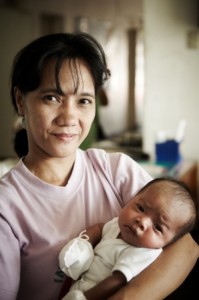how reproductive health can change the developing world

The theme for International Women’s Day earlier this month was ‘The Gender Agenda: Gaining Momentum’ and it could not be more apt given the recent horrific attacks on women in India and South Africa – attacks that are not unprecedented and are prevalent in too many countries around the world.
These acts of violence against women are, no doubt, cased in a cultural belief that women are the lesser sex – the belief that men have a right over women’s minds and bodies and if women don’t accept this it will be enforced against their will, not only by their husbands and fathers but by entire communities.
So how do we turn this gender imbalance around? What is the answer to giving women equality, power and a greater voice in the societies that refuse to listen to them? You’d probably be surprised if I said reproductive health and freedom. Maybe even a little confused about what that actually means. It simply means having the ability to decide when to reproduce and how often. It means being able to do so in the healthiest possible way with access to medical care. It means not having to resign your life to a cycle of pregnancy and childbirth and miss the opportunity to become educated and employed.
Working for a not-for-profit organisation that specialises in sexual and reproductive health makes the correlation between reproductive health and gender inequality glaringly obvious to me.
Although most may link discrimination against women to cultural and social beliefs in male superiority – which do indeed play a significant role – sexual and reproductive health rights are key to both creating and solving these gender disparities. In many parts of the world, a 15 year old girl is more likely to die from an unintended pregnancy than she is to finish her schooling. Every year, 90,000 women die due to an unmet need for family planning. A further 260,000 die due to a lack of maternal healthcare. 47,000 die due to unsafe abortion. Worldwide, pregnancy is the biggest killer of girls aged 15-19. If women are unable to have basic control over their own bodies, how is equality ever to be achieved?
When women do not have access to reproductive health it creates consequences that ripple into greater society. Women die younger and are not there to provide for their families. Sex selective abortion and female infanticide become tragic realities due to the low status of girls and women, particularly in extreme poverty. Unsafe abortion rates are rife – when they don’t lead to death they often lead to serious and permanent injury with no means to access medical care. Significant disparities in male to female ratios emerge that have unforeseeable consequences for the future. Ultimately, women are unable to gain a voice in society because pregnancy prevents them from achieving an education, cements them in poverty and restricts their contributions to their communities.
This only strengthens their image in society as “useless” or “inferior” and so the cycle goes.
Gender inequality is considered to be one of the main indicators of a nation’s social and human development. So much so that in 2010 the United Nations Development Program (UNDP) developed the Gender Inequality Index – a tool used to measure the national loss of achievement within a country due to gender inequality. It uses three dimensions: reproductive health, empowerment, and labour market participation.
According to the UNDP data, gender inequality in reproductive health accounts for the largest loss of national achievement globally. In other words, the lack of access to sexual and reproductive health for women is the biggest obstacle standing in the way of developing nations progressing.
Over 215 million women globally need access to contraception in order to improve their lives – a necessity as important as adequate food and clean water. That is an astounding figure when you consider what those women could achieve if they had control of their destiny.
That is 215 million more women with an education. 215 million more women in the workforce. Women who can earn money and reinvest in their families and communities. Who are able to be involved politically and socially and have the voice to stand up to discrimination and abuse. Who can pull themselves, their communities and entire nations out of poverty.
Just by having the power to decide when to have children and how many.
Giving women access to reproductive health is a human right. And it is a right that could change the status of women throughout the developing world.
Matylda Buczko studied Journalism, Literature and Creative Writing at RMIT and Monash University before undertaking a Master’s Degree in Media & Communications at Swinburne University. Currently, she is the Communications Coordinator at Marie Stopes International, a global not-for-profit organisation specialising in sexual and reproductive health. When Matylda isn’t writing about women’s reproductive rights, she enjoys eavesdropping in cafes, eating too much as a good excuse to laze on the couch and watching an awful lot of pirated film and TV until way past her bedtime.

